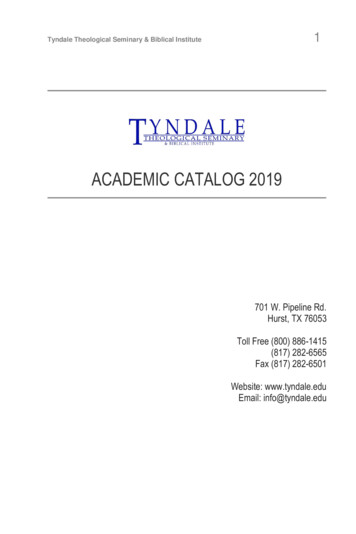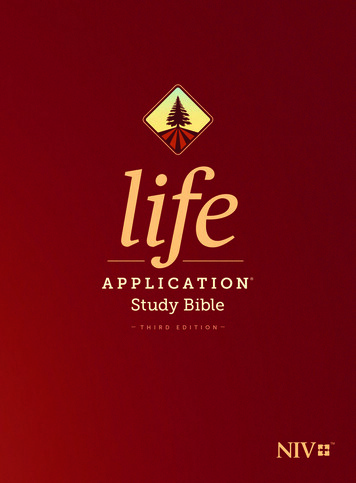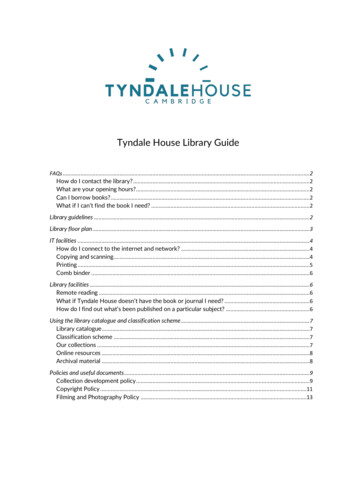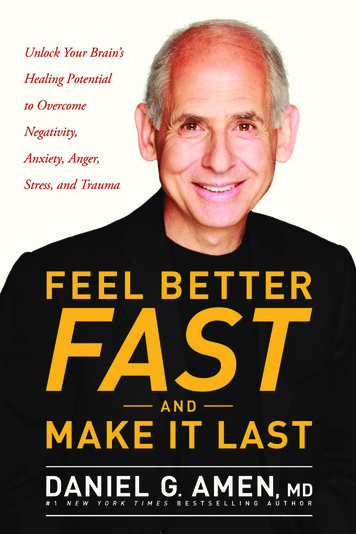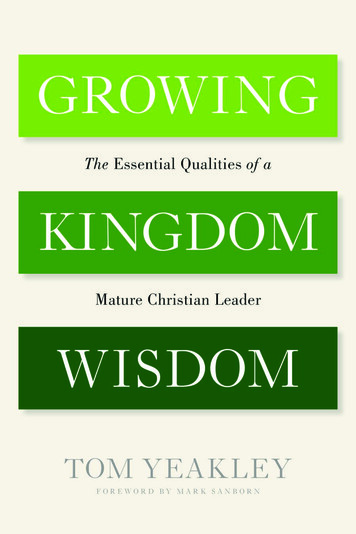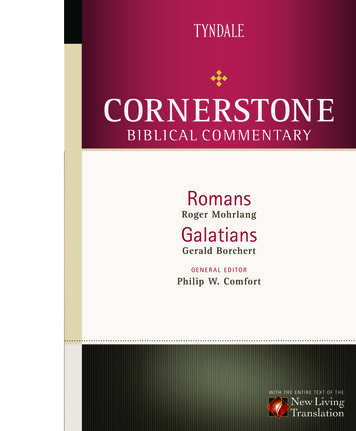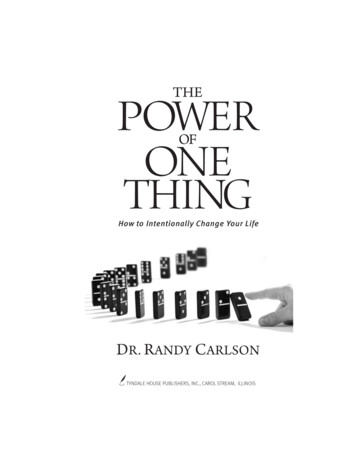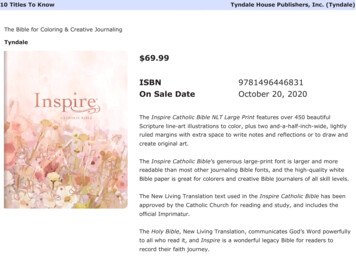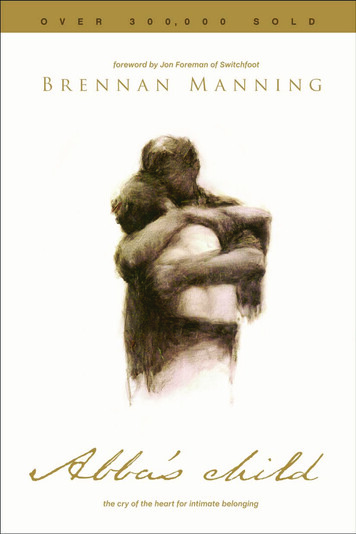
Transcription
Charlie Mackesy
Abba’s Child is not a book—it’s a love letter. Brennan’s words wrap youin God’s love and lullaby you to sleep in the warmth of his grace. Afterreading this book, I wanted to race into my father’s arms and jump intohis lap, giggling, “I’m home, Daddy, I’m home.”MICHAEL YACONELLIAuthor of Dangerous WonderThe writing of Brennan Manning reaches out, grabs us, and pulls us in.Abba’s Child is a book that leaps from the tower of theory and plungesdeeply into the stuff of life, the stuff that each of us grapples with on adaily basis. Facing our own reality is painful, traumatic, and ultimatelyredemptive, as Brennan Manning so artfully illustrates.DEVLIN DONALDSONThe Vista Grande CompanyHonest. Genuine. Creative. God hungry. These words surface whenI think of the writings of Brennan Manning. Read him for yourself—you’ll see what I mean!MAX LUCADONew York Times bestselling authorWith prophetic zeal, Brennan speaks to our heart’s deepest longingand manages to keep the focus on the One who meets it. Hearing,really hearing, this message—that we “belong”—has and willcontinue to revolutionize lives.DR. LARRY CRABBFounder, NewWay Ministries
BrennanManningthe cry of the heart for intimate belongingA NavPress resource published in alliancewith Tyndale House Publishers, Inc.
NavPress is the publishing ministry of The Navigators, an internationalChristian organization and leader in personal spiritual development.NavPress is committed to helping people grow spiritually and enjoy livesof meaning and hope through personal and group resources that arebiblically rooted, culturally relevant, and highly practical.For more information, visit www.NavPress.com.Abba’s Child: The Cry of the Heart for Intimate BelongingCopyright 1994, 2002, 2015 by Brennan Manning. All rights reserved.A NavPress resource published in alliance with Tyndale House Publishers, Inc.NAVPRESS and the NAVPRESS logo are registered trademarks of NavPress, The Navigators,Colorado Springs, CO. TYNDALE is a registered trademark of Tyndale House Publishers, Inc.Absence of in connection with marks of NavPress or other parties does not indicate an absenceof registration of those marks.Designed by Stephen VoslooCover illustration copyright Charlie Mackesy. All rights reserved.Published in association with the literary agency of Alive Literary Agency, 7680 Goddard St., Suite200, Colorado Springs, CO 80920.Unless otherwise indicated, all Scripture quotations are taken from The Jerusalem Bible, copyright 1966 by Darton, Longman & Todd, Ltd., and Doubleday & Company, Inc. Scripture quotationsmarked NIV are taken from the Holy Bible, New International Version, NIV. Copyright 1973,1978, 1984, 2011 by Biblica, Inc. Used by permission. All rights reserved worldwide. Scripturequotations marked NASB are taken from the New American Standard Bible, copyright 1960,1962, 1963, 1968, 1971, 1972, 1973, 1975, 1977, 1995 by The Lockman Foundation. Used bypermission.Some of the anecdotal illustrations in this book are true to life and are included with the permissionof the persons involved. All other illustrations are composites of real situations, and any resemblanceto people living or dead is coincidental. Cataloging- in- Publication Data is available.ISBN 978-1-63146-395-2Printed in the United States of America217206195184173162151
ContentsAcknowledgments ixForeword by Jon Foreman xiPreface to the 2015 Edition by John Blase xiiiPreface to the 2002 Edition by Brennan Manning xvA Word Before xix1 . Come Out of Hiding 12 . The Impostor 153 . The Beloved 314 . Abba’s Child 435 . The Pharisee and the Child 596 . Present Risenness 797 . The Recovery of Passion 978 . Fortitude and Fantasy 1159 . The Rabbi’s Heartbeat 131Internalizing the Book: Guide for Group Study 149Notes 157About the Author 165
ForewordTo be nobody-but-yourself—in a world which is doing its best, nightand day, to make you everybody else—means to fight the hardestbattle which any human being can fight; and never stop fighting.When I first read Abba’s Child, these words from E. E. Cummingsintroduced the preface. This quote and the book that followed spoketo me deeply. In Abba’s Child, Manning calls attention to a battle foridentity that’s fought nearly every hour of every day of our lives—a warthat’s almost completely unacknowledged and yet of extreme importance. Who am I? What is my place in the world? As humans, we arealways looking for our true identity against the noisy backdrop of ourtime. Am I defined by my occupation? My preferences? My passions?My true identity cannot be defined for me. Even the most meaningfulmoments in politics or music are still not enough to anchor me. And yetas I struggle to define myself in this world, my identity can never comefrom within. My actions, my art, even my beliefs—all of these need tobe rooted in soil other than myself.And so we begin the solitary journey toward discovering our uniqueidentity. Manning employs a chorus of wise voices who reassure methat though this road may be a lonely one, it is not mine to walk alone.Spiritual giants who have passed this way before have left guidepostsalong the way, reminding me that I cannot be defined by ever- changingseasons around me, nor can I be guided only by the voices within.Rather, my identity must continue to be found in the love of my CreatorHimself. I am loved. Deeply loved. And when I let that love define whoI am, I am suddenly free to be myself.In my songs I’m always looking for light. I’m looking for a windowxi
xiiA b b a’ s C h i l dor a mirror—something to frame my experience here on the planet ina new way that allows me to see the truth. Why am I always lookingfor these windows and doors? Because my ears become deaf, my eyesbecome blind. I desperately need new ways of looking at the world andat myself. I have a friend who is a visual artist. He defines “the artist” notas someone who creates beauty but as someone who looks for it. Andto that end I would say a good songwriter does the same thing: hopingfor more than just a new chorus, longing to be free from the same oldpatterns, to be transformed by the renewing of the mind moment bymoment, day by day.There are far too many voices within my head telling me to quit,telling me to abandon, to find an easier way, to ignore the pain, or tochoke it down. To find a book with a host of other voices singing backwas a joy. When I first read Abba’s Child a few years back, I had to writea song in response. So I wrote a tune called “Against the Voices,” directlyinspired by the words of Manning, Henri Nouwen, Thomas Merton,E. E. Cummings, Julian of Norwich, and the host of others whomBrennan Manning employs.If this is your first time reading this book, I’m honored to introduce you to it. I pray that Brennan Manning and the timeless voicesof the other thinkers quoted within this book might offer you hope.May they remind you that you are loved by the Father-Creator Himself.May they sing and speak into your life against the voices that tell youotherwise.Jon Foreman, lead singer for SwitchfootJa nua ry 2015, Ca r dif f -by-t he- S e a , Ca l ifor n i a
Preface to the 2015 EditionKeep practicing until it lives inside you;then it will seem foolishly easyto the unpracticed.— Bill Holm, “Fried Chicken in Iceland”Parents with multiple children say they love all their childrenequally, just differently. That’s true, and maybe not true. I believe someparents have f avorites— they just do. And I believe the favorites knowwho they are.When it comes to the books written by my friend Brennan Manning,it would be tempting to say “I love them all, just differently.” But that’snot true. I have a f avorite—Abba’s Child. It was the first of his books Iread, my introduction to the ragamuffin man, and maybe that’s why itmeans so much to me— you know, “first love” and all that. Then again,my affection for this book may have to do with the fact that after reading all of his books multiple times, and having the privilege of personally working with him on a handful of his final manuscripts, includingco writing his memoir, I believe the words in this book reveal his heart.They are the summa of Brennan Manning. I realize that’s a bold statement, but there you have it.Most writers have a central theme, and all their writings are usuallysome variation on that theme. While some might say Brennan’s themeis the grace of God, I would disagree: It is letting yourself be loved byGod. In one of our final conversations, I asked, “Brennan, are you lettingGod love you?” His reply was classic Brennan: “I’m trying.” That’s why Ixiii
xivA b b a’ s C h i l dbegan this preface with those words from the late Bill Holm—becauseletting God love him was something Brennan “kept practicing” throughout his years. What may have appeared “foolishly easy” to those whoknew him from the distance of books was far from it. He kept practicinguntil the very end.You’ll read of “the impostor” in these pages, probably the chaptergenerating the most discussion since Abba’s Child was published in1994. Even now, in the autumn of 2014, that chapter is worth the priceof admission. The impostor still runs amok today, aided and abetted bythe online- Facebook- Twitter- Instagrammy lives we live.The impostor prompts us to attach importance to what has no importance,clothing with a false glitter what is least substantial and turning us awayfrom what is real. The false self causes us to live in a world of delusion. . . The impostor demands to be noticed. His craving for complimentsenergizes his futile quest for carnal satisfaction. His bandages are hisidentity. Appearances are everything.See what I mean? Good grief. Please don’t hear me saying the Internetis the culprit here. But the Internet does speed things up, presenting lightning- fast challenges to acceptance and approval and suppressionand emotional honesty, just to name a few. If the game of pretense anddeception used to be at a gallop, we now play at warp speed. Into thisrushing stream, Brennan’s plea is evergreen: Live by grace and not byperformance. In other words— let God love you. And should you see meout and about somewhere and ask me how I’m personally doing withthat, I would answer as my friend so often did: I’m trying.— John BlaseSeptember 15, 2014
Preface to the 2002 EditionTo be nobody-but-yourself—in a world which is doing its best, nightand day, to make you everybody else—means to fight the hardestbattle which any human being can fight; and never stop fighting.— e. e. cummingsSince the publication of Abba’s Child in 1994, there have been morecomments on “The Impostor” than all the other chapters combined.Well, the impostor continues to reappear in new and devilish disguises.The slick, sick, and sinister impersonator of my true self stalks me evenin my sleep. His latest stratagem is to capitalize on my “senior moments,”blocking any memory of whether I gobbled my a nti- depressant and vitamin pills earlier this morning.Cunning and crafty, this radical poseur of my egocentric desiresexploits my temporary amnesia to make me forget that everything Iam is grace, that on my own I cannot receive it, for even receiving it isa gift—that is, the grace to grasp grace is grace. Instead of being nonplussed at the extravagance of God’s love, in place of heartfelt gratitudefor the sheer and unearned abundance of His gifts, a shameless sense ofsatisfaction about my accomplishments and a secure feeling of spiritualsuperiority invade my heart. The impostor is baffling, sly, and seductive.He persuades me to forsake my true self, Abba’s beloved child, and, asCummings notes, become “everybody else.”My greatest difficulty these past years has been bringing the impostor into the presence of Jesus. I am still inclined to flagellate the falseself, to beat him mercilessly for self- centeredness, to get disheartened,xv
xviA b b a’ s C h i l ddiscouraged, and decide that my alleged spiritual life is merely self- deception and fantasy. Self- flagellation has a personal history with me. When I was t wenty- t hree years old and a novice in the Franciscan Order in Washington,D.C., the order practiced an ancient spiritual discipline on the Fridaynights of Lent. A designated cleric stood flat- footed beside the stairwellon the first floor, slowly and loudly reciting Psalm 51 in Latin. Miserereme, Domine, secundum misericordiam, tuam . . .Meanwhile, the rest of us entered our cells on the second floor clutching a n oose- shaped instrument of torture measuring twelve inches long;it was coiled telephone wire. Throughout the duration of the psalm, wewhipped our backs and buttocks to extinguish the fire of lust. I flailedaway with such reckless abandon that I raised blood blisters on my back.The following day in the showers, a cleric took one look at my bludgeoned body and reported my condition to the novice master, whoreprimanded me for my intemperate zeal. Truth to tell, I was trying desperately to make myself pleasing to God.Not so with Brother Dismas, who lived in the cell adjacent to mine.I listened as he scourged himself so savagely I feared for both his healthand his sanity. I risked a peek through his cracked door: With a bemusedsmile and a cigarette in his left hand, he was whacking the wall—thwack,thwack, thwack. My response? I pitied the poor wretch and returned tomy cell with an insufferable sense of spiritual superiority.Flagellation is not healthy for either the body or the soul.The impostor must be called out of hiding and presented to Jesus,or feelings of hopelessness, confusion, shame, and failure will stalkus from dawn to dusk. Writing Abba’s Child was a profound spiritualexperience for me, and I wish to share one last reflection. Certaintruths can be spoken only from the well of exaggeration. In trying todescribe the transcend ent mystery of Abba’s love, I employed a plethoraof adjectives such as infinite, outlandish, mind- bending, ineffable, and
Pr eface to the 2002 Editionxv i iincomprehensible. Put them all together and they are still inadequatefor one simple reason: Mystery is spoiled by a word.Finally, my old and now retired spiritual director, Larry Hein, whowrote this blessing—“May all your expectations be frustrated, may allyour plans be thwarted, may all your desires be withered into nothingness, that you may experience the powerlessness and poverty of a childand sing and dance in the love of God, who is Father, Son, and Spirit”—has come up with another one:Today on planet Earth, may you experience the wonder and beauty ofyourself as Abba’s Child and temple of the Holy Spirit through Jesus Christour Lord.— Brennan Manning2002
A Word BeforeOn February 8, 1956, in a little chapel in Loretto, Pennsylvania, I wasambushed by Jesus of Nazareth. The road I’ve traveled these last thirty- e ight years is pockmarked by disastrous victories and magnificentdefeats, soul- diminishing successes and life- enhancing failures. Seasonsof fidelity and betrayal, periods of consolation and desolation, zeal andapathy, are not unknown to me. And there have been times . . .when the felt presence of God was more real to me than the chairI am sitting on;when the Word ricocheted like b roken- backed lightning in everycorner of my soul;when a storm of desire carried me to places I had never visited.And there have been other times . . .when I identified with the words of Mae West: “I used to be Snow W hite— but I drifted”;when the Word was as stale as old ice cream and as bland as tamesausage;when the fire in my belly flickered and died;when I mistook dried- up enthusiasm for g ray- haired wisdom;when I dismissed youthful idealism as mere naïveté;when I preferred cheap slivers of glass to the pearl of great price.If you relate to any of these experiences, you might want to browsethrough this book and pause to reclaim your core identity as Abba’s Child.— Brennan Manningxix
1 Come Out of HidingIn Flannery O’Connor’s short story The Turkey,1 the antihero and principal protagonist is a little boy named Ruller. He has a poor s elf- imagebecause nothing he turns his hand to seems to work. At night in bed heoverhears his parents analyzing him. “Ruller’s an unusual one,” his fathersays. “Why does he always play by himself?” And his mother answers,“How am I to know?”One day in the woods Ruller spots a wild and wounded turkey andsets off in hot pursuit. “Oh, if only I can catch it,” he cries. He will catchit, even if he has to run it out of state. He sees himself triumphantlymarching through the front door of his house with the turkey slung overhis shoulder and the whole family screaming, “Look at Ruller with thatwild turkey! Ruller, where did you get that turkey?”“Oh, I caught it in the woods. Maybe you would like me to catchyou one sometime.”But then the thought flashes across his mind, God will probably makeme chase that damn turkey all afternoon for nothing. He knows he shouldn’tthink that way about God— yet that’s the way he feels. If that’s the way hefeels, can he help it? He wonders if he is unusual.Ruller finally captures the turkey when it rolls over dead from aprevious gunshot wound. He hoists it on his shoulders and begins his1
2A b b a’ s C h i l dmessianic march back through the center of town. He remembers thethings he had thought before he got the bird. They were pretty bad, heguesses. He figures God has stopped him before it’s too late. He shouldbe very thankful. “Thank You, God,” he says. “Much obliged to You. Thisturkey must weigh ten pounds. You were mighty generous.”Maybe getting the turkey was a sign, he thinks. Maybe God wants himto be a preacher. He thinks of Bing Crosby and Spencer Tracy as heenters town with the turkey slung over his shoulder. He wants to dosomething for God, but he doesn’t know what. If anybody were playingthe accordion on the street today, he would give them his dime. It is theonly dime he has, but he would give it to them.He wishes he would see somebody begging. Suddenly he prays,“Lord, send me a beggar. Send me one before I get home.” God hasput the turkey here. Surely God will send him a beggar. He knows for afact God will send him one. Because he is an unusual child, he interestsGod. “Please, one right now—” And the minute he says it, an old beggarwoman heads straight toward him. His heart stomps up and down in hischest. He springs at the woman, shouting, “Here, here,” thrusts the dimeinto her hand, and dashes on without looking back.Slowly his heart calms, and he begins to feel a new f eeling— likebeing happy and embarrassed at the same time. Maybe, he thinks, hewill give all his money to her. He feels as if the ground does not need tobe under him any longer.Ruller notices a group of country boys shuffling behind him. Heturns around and asks generously, “Y’all wanna see this turkey?”They stare at him. “Where did ya get that turkey?”“I found it in the woods. I chased it dead. See, it’s been shot underthe wing.”“Lemme see it,” one boy says. Ruller hands him the turkey. The turkey’s head flies into his face as the country boy slings it up in the airand over his own shoulder and turns. The others turn with him andsaunter away.
Come Out of Hiding3They are a quarter of a mile away before Ruller moves. Finally theyare so far away he can’t even see them anymore. Then he creeps towardhome. He walks for a bit and then, noticing it is dark, suddenly beginsto run. And Flannery O’Connor’s exquisite tale ends with these words:“He ran faster and faster, and as he turned up the road to his house, hisheart was running as fast as his legs and he was certain that SomethingAwful was tearing behind him with its arms rigid and its fingers readyto clutch.”In Ruller many of us Christians stand revealed, naked, exposed. OurGod, it seems, is One who benevolently gives turkeys and capriciouslytakes them away. When He gives them, it signals His interest in andpleasure with us. We feel close to God and are spurred to generosity.When He takes them away, it signals His displeasure and rejection. Wefeel cast off by God. He is fickle, unpredictable, whimsical. He buildsus up only to let us down. He remembers our past sins and retaliates bysnatching the turkeys of health, wealth, inner peace, progeny, empire,success, and joy.And so we unwittingly project onto God our own attitudes and feelings toward ourselves. As Blaise Pascal wrote, “God made man in hisown image and man returned the compliment.” Thus, if we feel hatefultoward ourselves, we assume that God feels hateful toward us.But we cannot assume that He feels about us the way we feel about ourselves— unless we love ourselves compassionately, intensely, andfreely. In human form Jesus revealed to us what God is like. He exposedour projections for the idolatry they are and gave us the way to becomefree of them. It takes a profound conversion to accept that God is relentlessly tender and compassionate toward us just as we are— not in spite ofour sins and faults (that would not be total acceptance), but with them.Though God does not condone or sanction evil, He does not withholdHis love because there is evil in us.Because of how we feel about ourselves, it’s sometimes difficult tobelieve this. As numerous Christian authors, wiser and more insightful
4A b b a’ s C h i l dthan I, have said: We cannot accept love from another human beingwhen we do not love ourselves, much less accept that God could possibly love us.One night a friend asked his handicapped son, “Daniel, when yousee Jesus looking at you, what do you see in His eyes?”After a pause, the boy replied, “His eyes are filled with tears, Dad.”“Why, Dan?”An even longer pause. “Because He is sad.”“And why is He sad?”Daniel stared at the floor. When at last he looked up, his eyes glistened with tears. “Because I’m afraid.”The sorrow of God lies in our fear of Him, our fear of life, and our fearof ourselves. He anguishes over our self- absorption and self- sufficiency.Richard Foster wrote, “Today the heart of God is an open wound oflove. He aches over our distance and preoccupation. He mourns thatwe do not draw near to him. He grieves that we have forgotten him. Heweeps over our obsession with muchness and manyness. He longs forour presence.”2God’s sorrow lies in our refusal to approach Him when we havesinned and failed. A “slip” for an alcoholic is a terrifying experience.The obsession of the mind and body with booze returns with the wildfury of a sudden storm in springtime. When the person sobers up, he orshe is devastated. When I relapsed, I had two options: yield once againto guilt, fear, and depression—or rush into the arms of my heavenly Father; choose to live as a victim of my disease—or choose to trust inAbba’s immutable love.It is one thing to feel loved by God when our life is together and allour support systems are in place. Then self- acceptance is relatively easy.We may even claim that we are coming to like ourselves. When we arestrong, on top, in control, and as the Celts say, “in fine form,” a sense ofsecurity crystallizes.But what happens when life falls through the cracks? What happens
Come Out of Hiding5when we sin and fail, when our dreams shatter, when our investmentscrash, when we are regarded with suspicion? What happens when wecome f ace- to- face with the human condition?Ask any who have just gone through a separation or divorce. Arethey together now? Is their sense of security intact? Do they have astrong sense of s elf- worth? Do they still feel like beloved children? Ordoes God love them only in their “goodness” and not in their povertyand brokenness as well? Nicholas Harnan wrote,This [brokenness] is what needs to be accepted. Unfortunately, this iswhat we tend to reject. Here the seeds of a corrosive s elf- hatred take root.This painful vulnerability is the characteristic feature of our humanitythat most needs to be embraced in order to restore our human conditionto a healed state.3The fourteenth- century mystic Julian of Norwich said, “Our courteous Lord does not want his servants to despair because they fall oftenand grievously; for our falling does not hinder him in loving us.”4 Ourskepticism and timidity keep us from belief and acceptance; however,we don’t hate God, but we hate ourselves. Yet the spiritual life beginswith the acceptance of our wounded self.Seek out a true contemplative— not a person who hears angelicvoices and has fiery visions of the cherubim, but the person whoencounters God with naked trust. What will that man or woman tellyou? Thomas Merton responds, “Surrender your poverty and acknowledge your nothingness to the Lord. Whether you understand it or not,God loves you, is present in you, lives in you, dwells in you, calls you,saves you, and offers you an understanding and compassion which arelike nothing you have ever found in a book or heard in a sermon.”5God calls us to stop hiding and come openly to Him. God is the fatherwho ran to His prodigal son when he came limping home. God weepsover us when shame and s elf- hatred immobilize us. Yet as soon as we lose
6A b b a’ s C h i l dour nerve about ourselves, we take cover. Adam and Eve hid, and we all,in one way or another, have used them as role models. Why? Because wedo not like what we see. It is u ncomfortable— intolerable— to confrontour true selves. Simon Tugwell, in his book The Beatitudes, explains.And so, like runaway slaves, we either flee our own reality or manufacturea false self which is mostly admirable, mildly prepossessing, andsuperficially happy. We hide what we know or feel ourselves to be (whichwe assume to be unacceptable and unlovable) behind some kind ofappearance which we hope will be more pleasing. We hide behind prettyfaces which we put on for the benefit of our public. And in time we mayeven come to forget that we are hiding, and think that our assumed prettyface is what we really look like.6But God loves who we really a re— whether we like it or not. Godcalls us, as He did Adam, to come out of hiding. No amount of spiritualmakeup can render us more presentable to Him. As Merton said, “Wenever make this real, serious return to the center of our own nothingness before God. Hence we never enter into the deepest reality of ourrelationship with him.”7 His love, which called us into existence, calls usto come out of self- hatred and to step into His truth. “Come to me now,”Jesus says. “Acknowledge and accept who I want to be for you: a Saviorof boundless compassion, infinite patience, unbearable forgiveness, andlove that keeps no score of wrongs. Quit projecting onto Me your ownfeelings about yourself. At this moment your life is a bruised reed, andI will not crush it; a smoldering wick, and I will not quench it. You arein a safe place.”One of the most shocking contradictions in the American churchis the intense dislike many disciples of Jesus have for themselves. Theyare more displeased with their own shortcomings than they would everdream of being with someone else’s. They are sick of their own mediocrity and disgusted by their own inconsistency. David Seamands wrote,
Come Out of Hiding7Many Christians . . . find themselves defeated by the most powerfulpsychological weapon that Satan uses against Christians. This weaponhas the effectiveness of a deadly missile. Its name? Low self- esteem.Satan’s greatest psychological weapon is a gut-level feeling of inferiority,inadequacy, and low s elf- worth. This feeling shackles many Christians, inspite of wonderful spiritual experiences . . . and knowledge of God’s Word.Although they understand their position as sons and daughters of God, theyare tied up in knots, bound by a terrible feeling of inferiority, and chainedto a deep sense of worthlessness.8The story is often told of a man who made an appointment with thefamous psychologist Carl Jung to get help for chronic depression. Jungtold him to reduce his fourteen- hour workday to eight, go directly home,and spend the evenings in his study, quiet and all alone. The depressedman went to his study each night, shut the door, read a little HermannHesse or Thomas Mann, played a few Chopin études or some Mozart.After weeks of this, he returned to Jung, complaining that he could seeno improvement. On learning how the man had spent his time, Jungsaid, “But you didn’t understand. I didn’t want you to be with Hesseor Mann or Chopin or Mozart. I wanted you to be completely alone.”The man looked terrified and exclaimed, “I can’t think of any worsecompany.” Jung replied, “Yet this is the self you inflict on other peoplefourteen hours a day”9 (and, Jung might have added, the self you inflicton yourself).In my experience, s elf- hatred is the dominant malaise cripplingChristians and stifling their growth in the Holy Spirit. The melancholyspirit of Chekhov’s plays—“You live badly, my friends”—haunts theAmerican Christian conscience. Negative voices from our family of origin (“You will never amount to anything”), moralizing from the church,and pressure to be successful transform expectant pilgrims en route tothe heavenly Jerusalem into a dispirited traveling troupe of broodingHamlets and frightened Rullers. Alcoholism, workaholism, mounting
8A b b a’ s C h i l daddictive behaviors, and the escalating suicide rate reflect the magnitudeof the problem. Henri Nouwen observed,Over the years, I have come to realize that the greatest trap in our life is notsuccess, popularity, or power, but self- rejection. Success, popularity, andpower can indeed present a great temptation, but their seductive qualityoften comes from the way they are part of the much larger temptationto self- rejection. When we have come to believe in the voices that call usworthless and unlovable, then success, popularity, and power are easilyperceived as attractive solutions. The real trap, however, is s elf- rejection.As soon as someone accuses me or criticiz
reface to the 2002 Edition by Brennan Manning P xv ord Before A W xix 1. ome Out of Hiding C 1 2. he Impostor T 15 3. he Beloved T 31 4. bba's Child A 43 5. he Pharisee and the Child T 59 6. resent Risenness P 79 7. he Recovery of Passion T 97 8. ortitude and Fantasy F 115 9. he Rabbi's Heartbeat T 131

